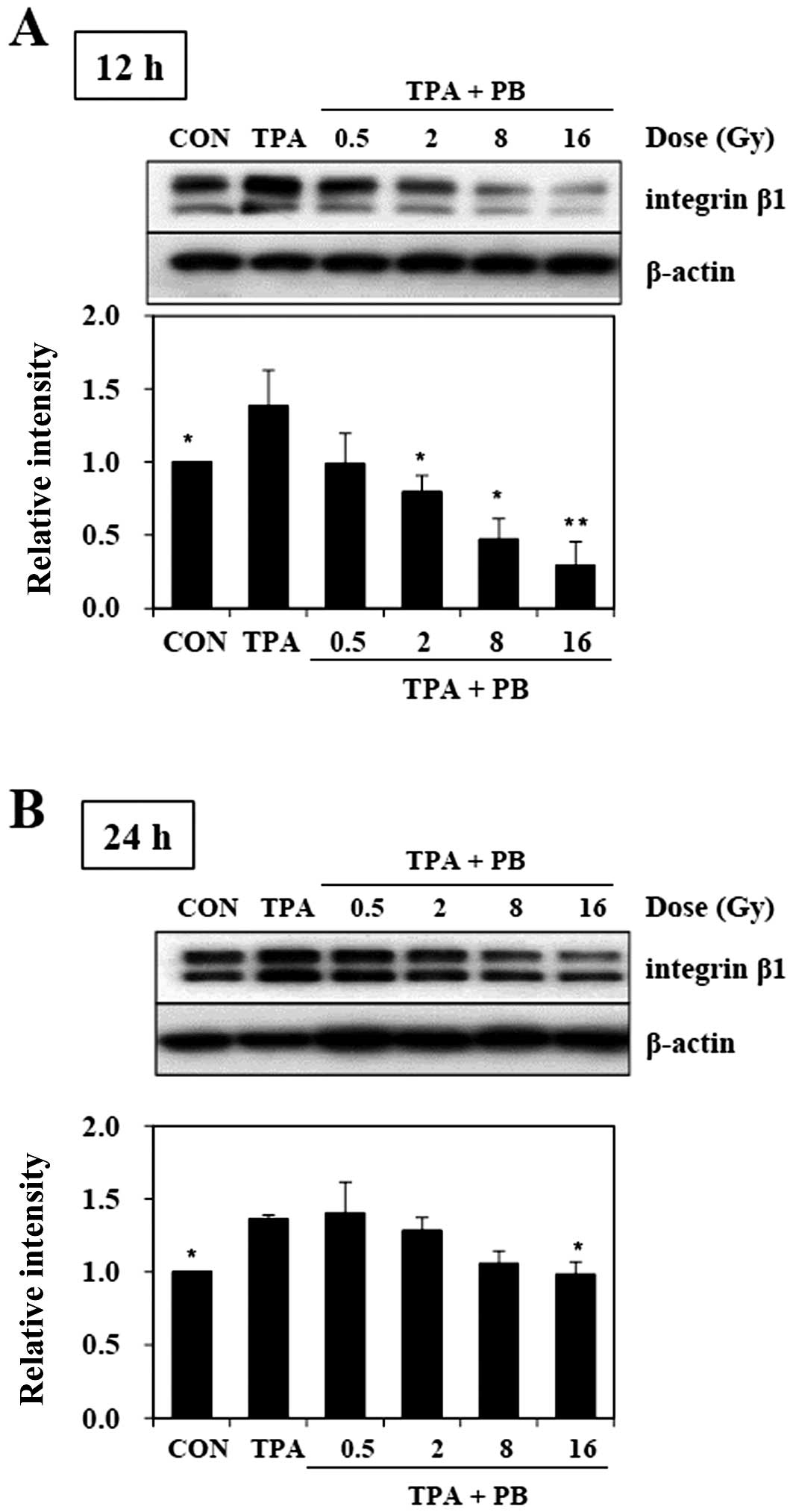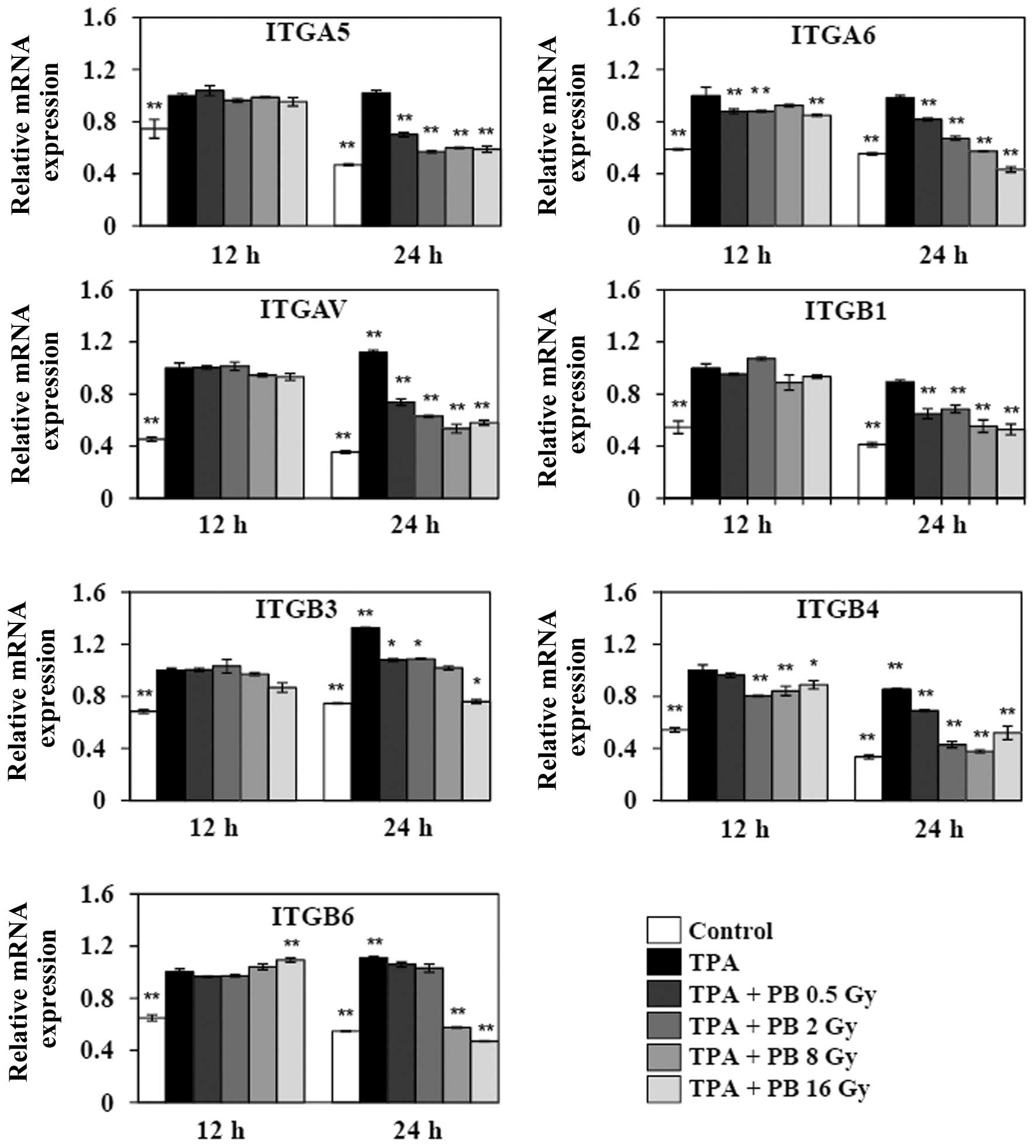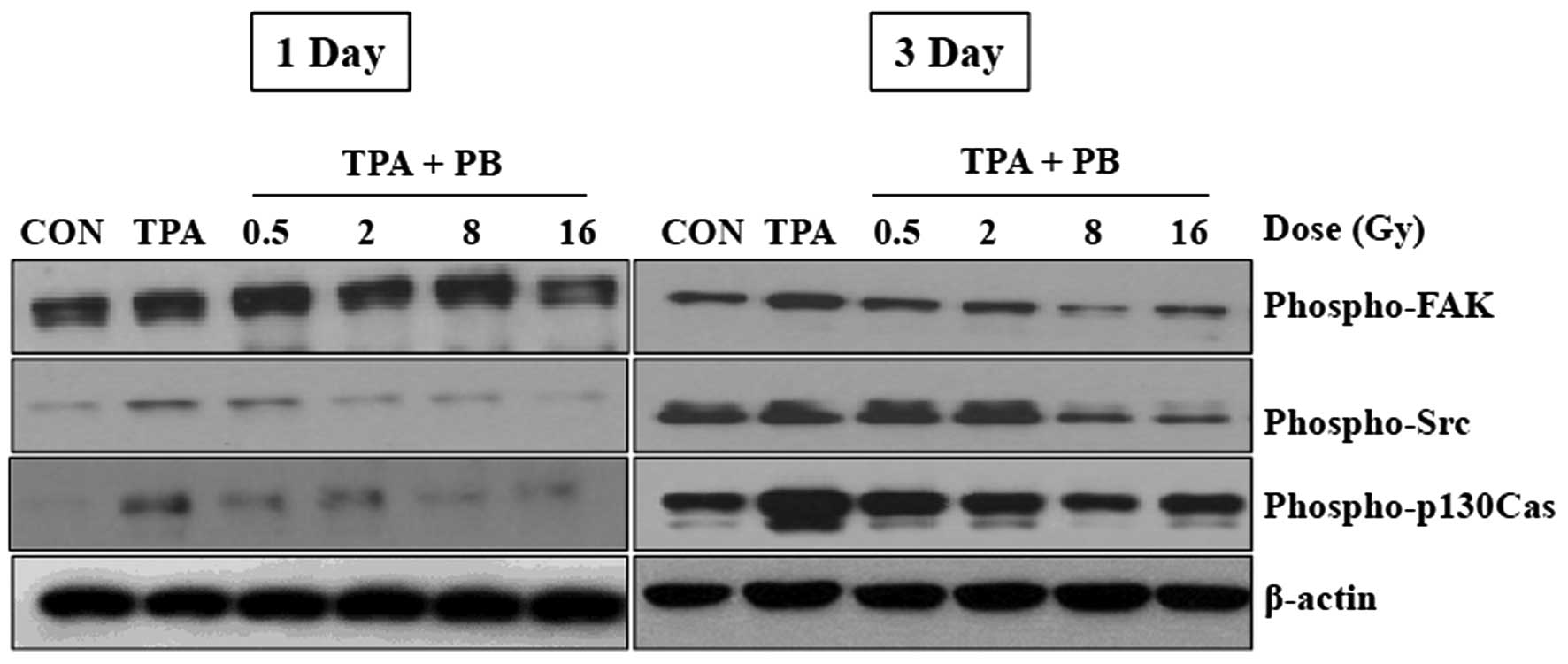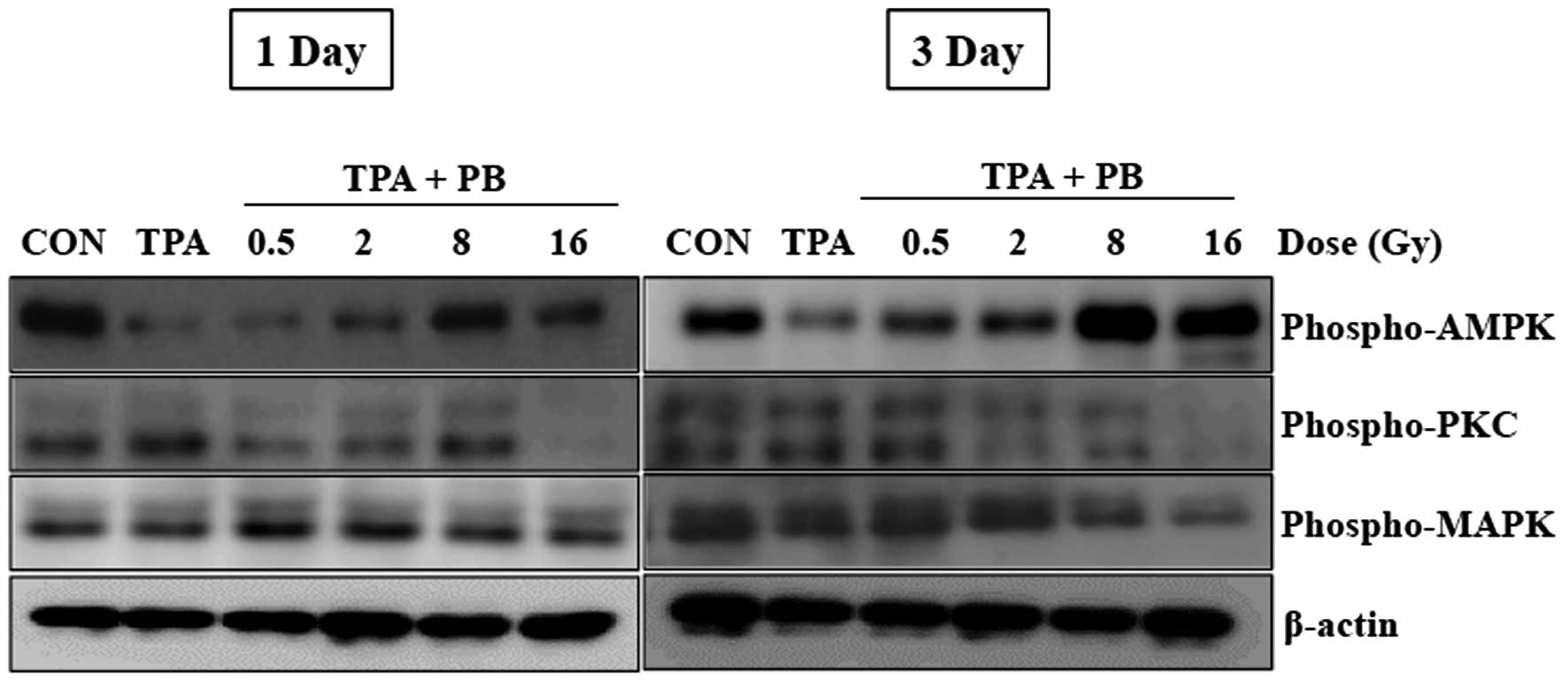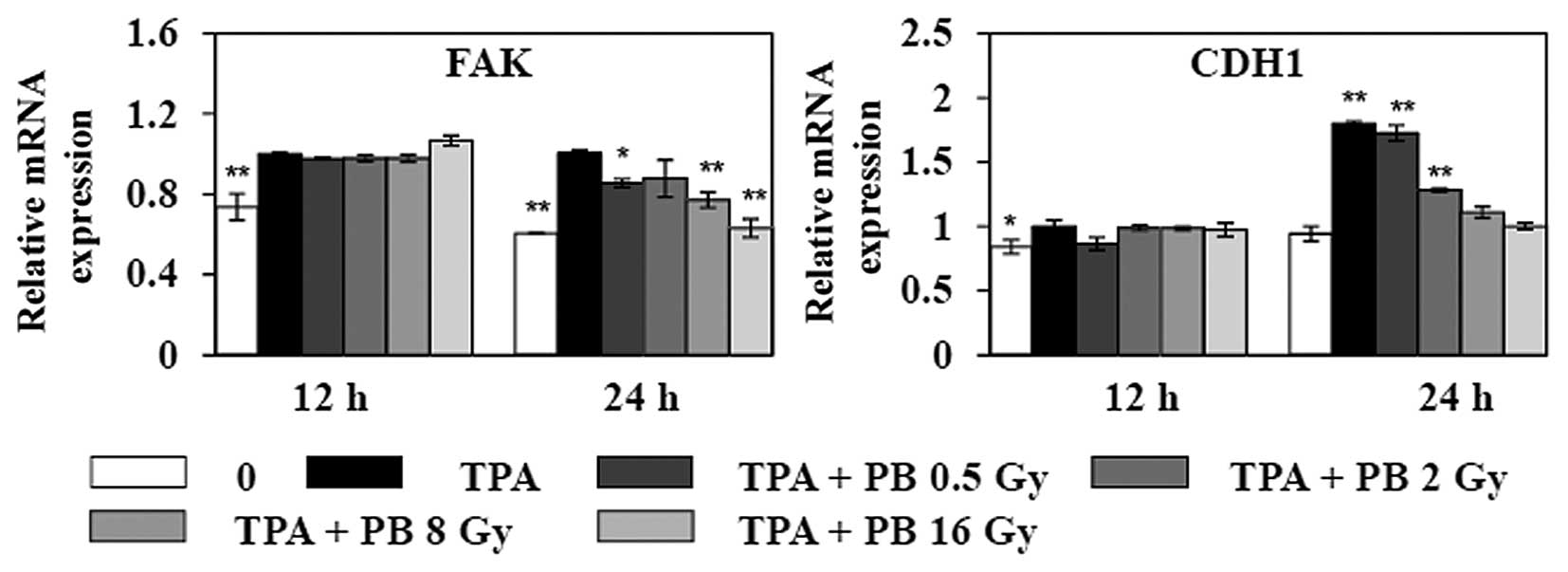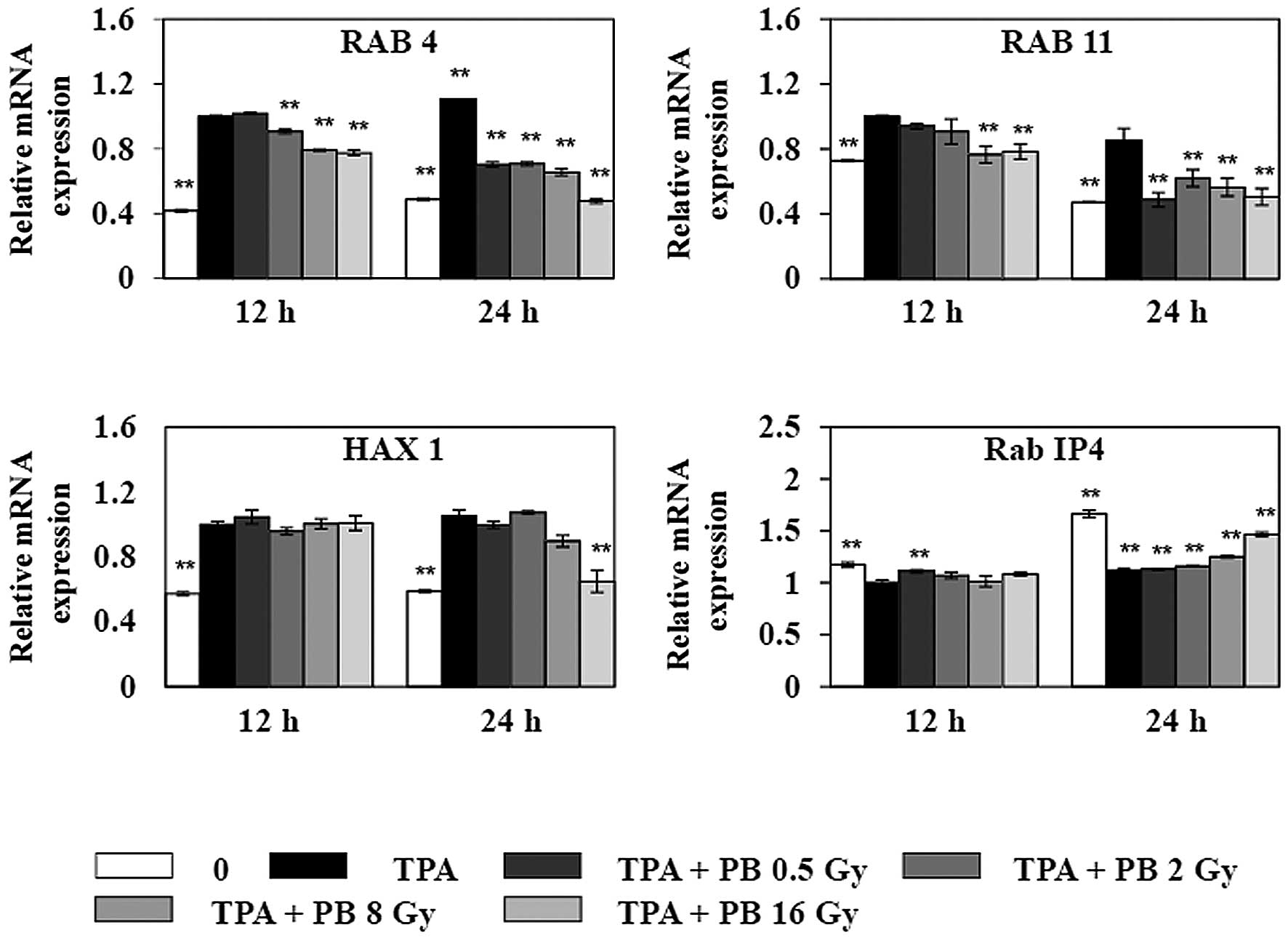|
1
|
Chaudhary AK, Pandya S, Ghosh K and
Nadkarni A: Matrix metalloproteinase and its drug targets therapy
in solid and hematological malignancies: An overview. Mutat Res.
753:7–23. 2013. View Article : Google Scholar : PubMed/NCBI
|
|
2
|
Ganguly KK, Pal S, Moulik S and Chatterjee
A: Integrins and metastasis. Cell Adhes Migr. 7:251–261. 2013.
View Article : Google Scholar
|
|
3
|
Cook DR, Rossman KL and Der CJ: Rho
guanine nucleotide exchange factors: Regulators of Rho GTPase
activity in development and disease. Oncogene. 33:4021–4035. 2014.
View Article : Google Scholar
|
|
4
|
Xiong J, Balcioglu HE and Danen EH:
Integrin signaling in control of tumor growth and progression. Int
J Biochem Cell Biol. 45:1012–1015. 2013. View Article : Google Scholar : PubMed/NCBI
|
|
5
|
Kapp TG, Rechenmacher F, Sobahi TR and
Kessler H: Integrin modulators: a patent review. Expert opinion on
therapeutic patents. 23:1273–1295. 2013. View Article : Google Scholar : PubMed/NCBI
|
|
6
|
Shin S, Wolgamott L and Yoon SO: Integrin
trafficking and tumor progression. Int J Cell Biol.
2012:5167892012. View Article : Google Scholar
|
|
7
|
Desgrosellier JS and Cheresh DA: Integrins
in cancer: Biological implications and therapeutic opportunities.
Nat Rev Cancer. 10:9–22. 2010. View
Article : Google Scholar
|
|
8
|
Mitra SK and Schlaepfer DD:
Integrin-regulated FAK-Src signaling in normal and cancer cells.
Curr Opin Cell Biol. 18:516–523. 2006. View Article : Google Scholar : PubMed/NCBI
|
|
9
|
Hahn SS, Tang Q, Zheng F, Zhao S, Wu J and
Chen J: Repression of integrin-linked kinase by antidiabetes drugs
through crosstalk of PPARγ- and AMPKα-dependent signaling: Role of
AP-2α and Sp1. Cell Signal. 26:639–647. 2014. View Article : Google Scholar
|
|
10
|
Caino MC, Chae YC, Vaira V, Ferrero S,
Nosotti M, Martin NM, Weeraratna A, O’Connell M, Jernigan D,
Fatatis A, et al: Metabolic stress regulates cytoskeletal dynamics
and metastasis of cancer cells. J Clin Invest. 123:2907–2920. 2013.
View Article : Google Scholar : PubMed/NCBI
|
|
11
|
Wang J, Wu J, Hong J, Chen R, Xu K, Niu W,
Peng C, Liu E, Wang J, Liu S, et al: PKC promotes the migration of
colon cancer cells by regulating the internalization and recycling
of integrin αvβ6. Cancer Lett. 311:38–47. 2011. View Article : Google Scholar : PubMed/NCBI
|
|
12
|
Chen J, Elfiky A, Han M, Chen C and Saif
MW: The role of Src in colon cancer and its therapeutic
implications. Clin Colorectal Cancer. 13:5–13. 2014. View Article : Google Scholar
|
|
13
|
Caswell PT and Norman JC: Integrin
trafficking and the control of cell migration. Traffic. 7:14–21.
2006. View Article : Google Scholar : PubMed/NCBI
|
|
14
|
Hutagalung AH and Novick PJ: Role of Rab
GTPases in membrane traffic and cell physiology. Physiol Rev.
91:119–149. 2011. View Article : Google Scholar : PubMed/NCBI
|
|
15
|
Subramani D and Alahari SK:
Integrin-mediated function of Rab GTPases in cancer progression.
Mol Cancer. 9:3122010. View Article : Google Scholar : PubMed/NCBI
|
|
16
|
Vukmirica J, Monzo P, Le Marchand-Brustel
Y and Cormont M: The Rab4A effector protein Rabip4 is involved in
migration of NIH 3T3 fibroblasts. J Biol Chem. 281:36360–36368.
2006. View Article : Google Scholar : PubMed/NCBI
|
|
17
|
Ramsay AG, Keppler MD, Jazayeri M, Thomas
GJ, Parsons M, Violette S, Weinreb P, Hart IR and Marshall JF:
HS1-associated protein X-1 regulates carcinoma cell migration and
invasion via clathrin-mediated endocytosis of integrin alphavbeta6.
Cancer Res. 67:5275–5284. 2007. View Article : Google Scholar : PubMed/NCBI
|
|
18
|
Mitin T and Zietman AL: Promise and
pitfalls of heavy-particle therapy. J Clin Oncol. 32:2855–2863.
2014. View Article : Google Scholar : PubMed/NCBI
|
|
19
|
Nam KS, Kim MK and Shon YH: Cancer
chemopreventive enzymes of human colorectal adenocarcinoma cells
irradiated with proton beams. J Korean Phys Soc. 52:945–948. 2008.
View Article : Google Scholar
|
|
20
|
Nam KS and Shon YH: Suppression of
metastatic potential in human colorectal adenocarcinoma cells
irradiated with proton beams. J Korean Phys Soc. 59:709–712. 2011.
View Article : Google Scholar
|
|
21
|
Lee KB, Kim KR, Huh TL and Lee YM: Proton
induces apoptosis of hypoxic tumor cells by the p53-dependent and
p38/JNK MAPK signaling pathways. Int J Oncol. 33:1247–1256.
2008.PubMed/NCBI
|
|
22
|
Sikorsky JA, Primerano DA, Fenger TW and
Denvir J: Effect of DNA damage on PCR amplification efficiency with
the relative threshold cycle method. Biochem Biophys Res Commun.
323:823–830. 2004. View Article : Google Scholar : PubMed/NCBI
|
|
23
|
Combs SE, Djosanjh M, Pötter R, Orrechia
R, Haberer T, Durante M, Fossati P, Parodi K, Balosso J, Amaldi U,
et al: Towards clinical evidence in particle therapy: ENLIGHT,
PARTNER, ULICE and beyond. J Radiat Res (Tokyo). 54(Suppl 1):
i6–i12. 2013. View Article : Google Scholar
|
|
24
|
Lee SU, Park JW, Kim TH, Kim YJ, Woo SM,
Koh YH, Lee WJ, Park SJ, Kim DY and Kim CM: Effectiveness and
safety of proton beam therapy for advanced hepatocellular carcinoma
with portal vein tumor thrombosis. Strahlenther Onkol. 190:806–814.
2014. View Article : Google Scholar : PubMed/NCBI
|
|
25
|
Chang JY, Komaki R, Lu C, Wen HY, Allen
PK, Tsao A, Gillin M, Mohan R and Cox JD: Phase 2 study of
high-dose proton therapy with concurrent chemotherapy for
unresectable stage III nonsmall cell lung cancer. Cancer.
117:4707–4713. 2011. View Article : Google Scholar : PubMed/NCBI
|
|
26
|
Hoppe B, Henderson R, Mendenhall WM,
Nichols RC, Li Z and Mendenhall NP: Proton therapy for prostate
cancer. Oncology. 25:644–650. 6522011.PubMed/NCBI
|
|
27
|
Frank SJ and Selek U: Proton beam
radiation therapy for head and neck malignancies. Curr Oncol Rep.
12:202–207. 2010. View Article : Google Scholar : PubMed/NCBI
|
|
28
|
Gridley DS, Pecaut MJ, Mao XW, Wroe AJ and
Luo-Owen X: Biological effects of passive versus active scanning
proton beams on human lung epithelial cells. Technol Cancer Res
Treat. 14:81–98. 2015.
|
|
29
|
Wéra AC, Heuskin AC, Riquier H, Michiels C
and Lucas S: Low-LET proton irradiation of A549 non-small cell lung
adenocarcinoma cells: Dose response and RBE determination. Radiat
Res. 179:273–281. 2013. View
Article : Google Scholar : PubMed/NCBI
|
|
30
|
Zaboronok A, Isobe T, Yamamoto T, Sato E,
Takada K, Sakae T, Tsurushima H and Matsumura A: Proton beam
irradiation stimulates migration and invasion of human U87
malignant glioma cells. J Radiat Res (Tokyo). 55:283–287. 2014.
View Article : Google Scholar
|
|
31
|
Brakebusch C and Fässler R: beta 1
integrin function in vivo: Adhesion, migration and more. Cancer
Metastasis Rev. 24:403–411. 2005. View Article : Google Scholar : PubMed/NCBI
|
|
32
|
Canel M, Serrels A, Frame MC and Brunton
VG: E-cadherin-integrin crosstalk in cancer invasion and
metastasis. J Cell Sci. 126:393–401. 2013. View Article : Google Scholar : PubMed/NCBI
|
|
33
|
Jahangiri A, Aghi MK and Carbonell WS: β1
integrin: Critical path to antiangiogenic therapy resistance and
beyond. Cancer Res. 74:3–7. 2014. View Article : Google Scholar :
|
|
34
|
Parvani JG, Galliher-Beckley AJ, Schiemann
BJ and Schiemann WP: Targeted inactivation of β1 integrin induces
β3 integrin switching, which drives breast cancer metastasis by
TGF-β. Mol Biol Cell. 24:3449–3459. 2013. View Article : Google Scholar : PubMed/NCBI
|
|
35
|
Howe GA and Addison CL: β1 integrin: An
emerging player in the modulation of tumorigenesis and response to
therapy. Cell Adhes Migr. 6:71–77. 2012. View Article : Google Scholar
|
|
36
|
Nam JM, Chung Y, Hsu HC and Park CC: beta1
integrin targeting to enhance radiation therapy. Int J Radiat Biol.
85:923–928. 2009. View Article : Google Scholar : PubMed/NCBI
|
|
37
|
Lesniak D, Sabri S, Xu Y, Graham K,
Bhatnagar P, Suresh M and Abdulkarim B: Spontaneous
epithelial-mesenchymal transition and resistance to HER-2-targeted
therapies in HER-2-positive luminal breast cancer. PLoS One.
8:e719872013. View Article : Google Scholar : PubMed/NCBI
|
|
38
|
Huang C, Park CC, Hilsenbeck SG, Ward R,
Rimawi MF, Wang YC, Shou J, Bissell MJ, Osborne CK and Schiff R: β1
integrin mediates an alternative survival pathway in breast cancer
cells resistant to lapatinib. Breast Cancer Res. 13:R842011.
View Article : Google Scholar
|
|
39
|
Moran-Jones K, Ledger A and Naylor MJ: β1
integrin deletion enhances progression of prostate cancer in the
TRAMP mouse model. Sci Rep. 2:5262012. View Article : Google Scholar
|
|
40
|
Harburger DS and Calderwood DA: Integrin
signalling at a glance. J Cell Sci. 122:159–163. 2009. View Article : Google Scholar : PubMed/NCBI
|
|
41
|
Caswell PT, Vadrevu S and Norman JC:
Integrins: Masters and slaves of endocytic transport. Nat Rev Mol
Cell Biol. 10:843–853. 2009. View
Article : Google Scholar : PubMed/NCBI
|
|
42
|
Makrilia N, Kollias A, Manolopoulos L and
Syrigos K: Cell adhesion molecules: Role and clinical significance
in cancer. Cancer Invest. 27:1023–1037. 2009. View Article : Google Scholar : PubMed/NCBI
|
|
43
|
Ramirez NE, Zhang Z, Madamanchi A, Boyd
KL, O’Rear LD, Nashabi A, Li Z, Dupont WD, Zijlstra A and Zutter
MM: The α(2)β(1) integrin is a metastasis suppressor in mouse
models and human cancer. J Clin Invest. 121:226–237. 2011.
View Article : Google Scholar :
|
|
44
|
Mattila E, Pellinen T, Nevo J, Vuoriluoto
K, Arjonen A and Ivaska J: Negative regulation of EGFR signalling
through integrin-alpha1beta1-mediated activation of protein
tyrosine phosphatase TCPTP. Nat Cell Biol. 7:78–85. 2005.
View Article : Google Scholar
|
|
45
|
Grahame Hardie D: AMP-activated protein
kinase: A key regulator of energy balance with many roles in human
disease. J Intern Med. 276:543–559. 2014. View Article : Google Scholar : PubMed/NCBI
|
|
46
|
Shackelford DB and Shaw RJ: The LKB1-AMPK
pathway: Metabolism and growth control in tumour suppression. Nat
Rev Cancer. 9:563–575. 2009. View Article : Google Scholar : PubMed/NCBI
|
|
47
|
Bardeesy N, Sinha M, Hezel AF, Signoretti
S, Hathaway NA, Sharpless NE, Loda M, Carrasco DR and DePinho RA:
Loss of the Lkb1 tumour suppressor provokes intestinal polyposis
but resistance to transformation. Nature. 419:162–167. 2002.
View Article : Google Scholar : PubMed/NCBI
|
|
48
|
Kato K, Ogura T, Kishimoto A, Minegishi Y,
Nakajima N, Miyazaki M and Esumi H: Critical roles of AMP-activated
protein kinase in constitutive tolerance of cancer cells to
nutrient deprivation and tumor formation. Oncogene. 21:6082–6090.
2002. View Article : Google Scholar : PubMed/NCBI
|
|
49
|
Chan KT, Asokan SB, King SJ, Bo T, Dubose
ES, Liu W, Berginski ME, Simon JM, Davis IJ, Gomez SM, et al: LKB1
loss in melanoma disrupts directional migration toward
extracellular matrix cues. J Cell Biol. 207:299–315. 2014.
View Article : Google Scholar : PubMed/NCBI
|
|
50
|
Goodwin JM, Svensson RU, Lou HJ, Winslow
MM, Turk BE and Shaw RJ: An AMPK-independent signaling pathway
downstream of the LKB1 tumor suppressor controls Snail1 and
metastatic potential. Mol Cell. 55:436–450. 2014. View Article : Google Scholar : PubMed/NCBI
|















